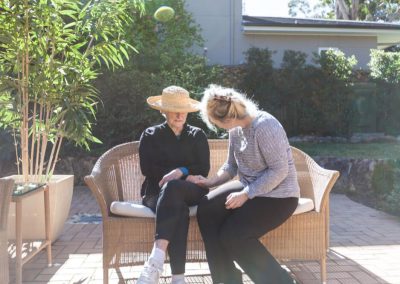
Caring for a loved one with dementia at home is a journey filled with both challenges and rewards. At Group Homes Australia (GHA), we understand the importance of providing a nurturing and secure environment for individuals navigating the complexities of dementia. While our specialised homes offer comprehensive dementia care, we also recognise the desire for many families to provide care within the comfort of their own homes.
This blog post is designed to equip you with practical strategies and insights to create a dementia-friendly home environment that prioritises safety, well-being, and independence for your loved one. Let’s delve into the essential elements of dementia care at home and discover how you can foster a supportive haven for your loved one.
Understanding Dementia Care at Home
Dementia care at home involves adapting your living environment and routines to meet the needs of your loved one. It requires patience, empathy, and a proactive approach to ensure their safety and well-being. The goal is to create a space that feels familiar and secure while promoting independence and engagement.
The Importance of a Safe Environment
Safety is paramount in dementia care. A well-organised and hazard-free home can significantly reduce the risk of accidents and help your loved one feel more secure. Key strategies include:
- Removing Clutter: Keep pathways clear to prevent trips and falls.
- Installing Safety Devices: Use grab bars in bathrooms, non-slip mats, and adequate lighting.
- Securing Hazardous Items: Lock away sharp objects, cleaning supplies, and medications.
By making these adjustments, you create a safer living space that can help mitigate common risks associated with dementia.
Practical Strategies for Dementia Care at Home
Here are some practical strategies to help you create a supportive environment for dementia care at home:
Establishing Routines
Consistency and routine are crucial for individuals with dementia. Regular schedules can reduce confusion and anxiety. Consider the following:
- Daily Activities: Plan activities like meals, exercise, and bedtime at the same times each day.
- Simple Instructions: Use clear and simple instructions for tasks to avoid overwhelming your loved one.
- Visual Aids: Use calendars, clocks, and labels to help orient them to time and place.
Establishing routines helps provide structure and predictability, which can be comforting for someone with dementia.
Creating a Dementia-Friendly Home
Designing a dementia-friendly home involves thoughtful modifications that cater to the specific needs of your loved one. Key considerations include:
- Colour Contrast: Use contrasting colours for walls, floors, and furniture to help with depth perception.
- Familiar Objects: Surround them with familiar objects and photos to evoke positive memories.
- Quiet Spaces: Create calm and quiet areas where they can retreat when feeling overwhelmed.
These changes can make the home environment more navigable and less confusing.
Engaging Activities for Dementia Care
Engagement in meaningful activities is essential for maintaining cognitive function and emotional well-being. At GHA, we focus on getting residents involved in day-to-day life activities that bring them purpose and meaning. Here are some activities to consider:
Cooking and Baking
Involving your loved one in simple cooking and baking tasks can be therapeutic and enjoyable. Benefits include:
- Sensory Stimulation: Engaging the senses of smell, taste, and touch.
- Sense of Achievement: Completing a task can boost self-esteem and provide a sense of accomplishment.
- Social Interaction: Cooking together can foster social bonds and communication.
Exercise and Yoga
Regular physical activity is crucial for maintaining health and well-being. Activities like exercise and yoga offer numerous benefits:
- Improved Mobility: Enhances physical strength and flexibility.
- Reduced Anxiety: Physical activity can help alleviate anxiety and agitation.
- Enhanced Mood: Exercise releases endorphins, promoting a positive mood.
Gardening Activities
Gardening can be a soothing and rewarding activity for individuals with dementia. Benefits include:
- Connection with Nature: Spending time outdoors and connecting with nature.
- Physical Exercise: Gardening involves physical activity that can improve mobility.
- Cognitive Engagement: Planning and tending to plants stimulate cognitive functions.
At GHA, we incorporate these activities into our daily routines, helping residents find joy and purpose in everyday tasks.
Support Systems and Resources
Caring for a loved one with dementia can be demanding, so it’s essential to have support systems in place. Here are some resources and tips:
Professional Support
Don’t hesitate to seek professional support when needed. Options include:
- Home Health Aides: Trained professionals who can assist with daily care tasks.
- Respite Care: Temporary relief for primary caregivers, allowing them to rest and recharge.
- Support Groups: Connecting with others who are in similar situations can provide emotional support and practical advice.
Educational Resources
Educating yourself about dementia and caregiving can empower you to provide better care. Useful resources include:
- Online Courses and Webinars: Many organisations offer free or low-cost educational materials.
- Books and Articles: There are numerous books and articles on dementia care strategies.
- Local Workshops: Check with local health services for workshops and seminars.
Staying informed can help you navigate the challenges of dementia care more effectively.
Emphasising Personalised Care
Personalised care is at the core of effective dementia care. Every individual is unique, and their care should reflect their personal history, preferences, and needs.
Understanding Your Loved One’s History
Take the time to learn about your loved one’s past, including their hobbies, interests, and significant life events. This knowledge can help you:
- Engage in Meaningful Conversations: Discussing familiar topics can evoke positive memories and foster communication.
- Plan Activities: Tailor activities to their interests and abilities.
- Build Trust: Showing genuine interest in their past can strengthen your bond.
Adapting to Changing Needs
Dementia is a progressive condition, and the needs of your loved one will change over time. It’s essential to:
- Monitor Their Health: Regularly assess their physical and cognitive health.
- Adjust Care Plans: Be flexible and willing to modify care strategies as needed.
- Seek Professional Advice: Consult healthcare professionals for guidance on managing changes in behaviour and abilities.
At GHA, we emphasise personalised care plans that evolve with the needs of our residents, ensuring they receive the best possible support at all times.
Conclusion
Creating a safe and supportive environment for dementia care at home is both a challenging and rewarding endeavour. By implementing practical strategies, engaging in meaningful activities, and seeking support when needed, you can enhance the quality of life for your loved one. At Group Homes Australia, we are dedicated to providing personalised, high-quality care that allows individuals with dementia to live well and cherish life’s moments.
For more information about our approach to dementia care and the services we offer, please visit our website.
